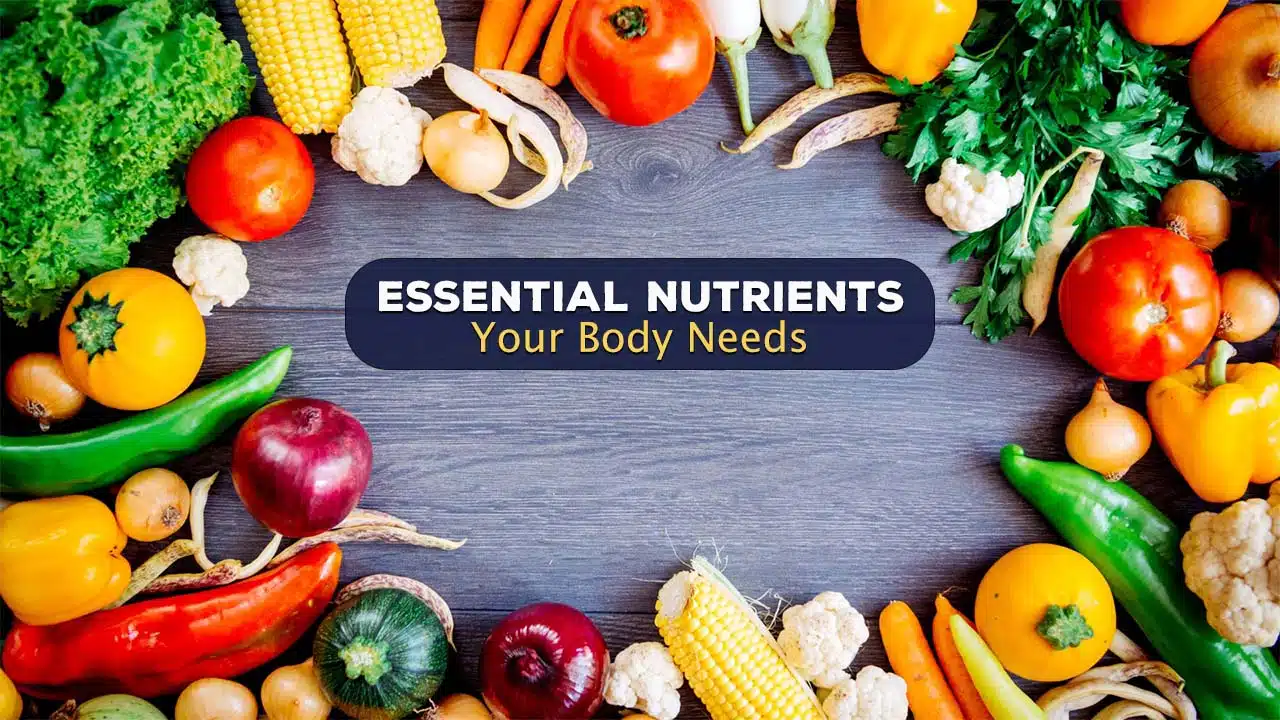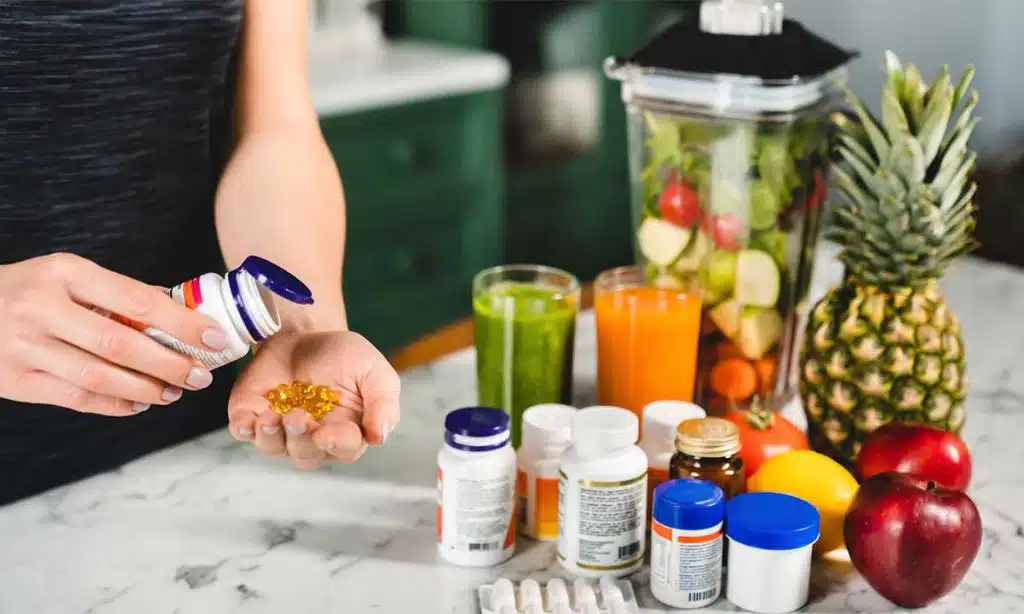Your body needs certain nutrients to stay healthy and strong. These nutrients are like fuel that keeps your body running smoothly. Without them, you might feel tired or get sick more often.
The 12 essential nutrients are fundamental building blocks for your health. They help your body grow, heal, and work right. You can get these nutrients from eating different foods. Knowing what they are and why you need them can help you make wise food choices.
Understanding Nutritional Basics
Nutrients are the building blocks that keep your body running smoothly. They fuel your cells, support growth, and help fight off illness. Let’s explore the critical types of nutrients your body needs.
The Role of Macronutrients
Macronutrients are the nutrients you need in large amounts. These include:
- Carbohydrates: Your body’s primary energy source
- Proteins: Essential for building and repairing tissues
- Fats: Provide backup energy and help absorb vitamins
Carbs give you quick energy for daily activities. Proteins are crucial for muscle health and immune function. Fats help you feel full and support brain health.
A balanced diet should include all three macronutrients. Aim for whole grains, lean meats, fish, nuts, and healthy oils.
The Importance of Micronutrients
Micronutrients are needed in smaller amounts but are just as vital. These include:
- Vitamins: Support various body functions
- Minerals: Help build strong bones and teeth
Your body can’t make most micronutrients, so you must get them from food. Fruits and veggies are packed with vitamins A and C. Dairy products offer calcium for solid bones.
Iron in meats and beans helps carry oxygen in your blood. Zinc boosts your immune system and aids in wound healing.
Eating a rainbow of fruits and veggies ensures you get a wide range of micronutrients. This variety helps your body work at its best.
How Nutrients Affect Overall Health?
Nutrients play a crucial role in keeping your body functioning well. They impact many parts of your health, from physical strength to brain power.
Impact on Physical Health
Nutrients fuel your body and keep it running smoothly. Proteins help build and repair muscles, bones, and skin. They’re crucial for a robust immune system, too.
Carbs give you energy for daily tasks and exercise. Fats protect your organs and help absorb some vitamins. Vitamins and minerals support many body processes.
Getting enough nutrients can:
- Boost your immune system
- Help you maintain a healthy weight
- Keep your heart healthy
- Strengthen your bones
- Give you more energy
Not getting enough nutrients can lead to health problems. You might feel tired or get sick more often.
Connection to Cognitive Function
The food you eat affects your brain health, too. Your brain needs nutrients to work well. Certain nutrients are extra crucial for brain function.
Omega-3 fatty acids help brain cells communicate. They may improve memory and lower the risk of some brain diseases. B vitamins support brain energy, and help make brain chemicals.
Antioxidants protect brain cells from damage. They’re found in many fruits and vegetables. Iron helps carry oxygen to your brain, keeping you alert and focused.
Eating a balanced diet can:
- Improve your memory
- Help you focus better
- Boost your mood
- Support long-term brain health
Skipping meals or eating poorly can make it hard to think clearly or remember things.
1. Vitamin A
Vitamin A is a crucial nutrient your body needs for good health. It comes in two forms: retinol from animal foods and plant carotenoids.
Your eyes rely on vitamin A to work correctly. It helps you see in low light and keeps your vision sharp. Without enough, you might have trouble seeing at night.
Vitamin A also supports your immune system. It helps your body fight off germs and stay healthy. This vitamin is also vital for keeping your skin, lungs, and gut lining strong.
Many foods contain vitamin A. Carrots, sweet potatoes, and spinach are rich in plant-based forms. For animal sources, try eggs, milk, and liver.
Your body stores vitamin A in the liver. It’s a fat-soluble vitamin, so eating it with fat helps your body absorb it better.
Getting enough vitamin A is essential, but don’t overdo it. Too much can be harmful, especially if you’re pregnant. Aim for the right amount to keep your body working well.
2. Vitamin D
Vitamin D is crucial for your body’s health. It helps you absorb calcium, which keeps your bones strong. Your skin makes vitamin D when exposed to sunlight.
You can also get vitamin D from food. Fatty fish, like salmon and tuna, are good sources. Egg yolks, cheese, and mushrooms contain small amounts too.
Many foods are fortified with vitamin D. Look for it in milk, orange juice, and breakfast cereals. These can help you meet your daily needs.
Your body needs vitamin D to fight off infections. It supports your immune system and may help prevent some diseases. Low levels increase your risk of respiratory infections.
The amount of vitamin D you need varies by age. Infants up to 12 months old need 400 IU daily. Children and adults generally need 600 IU per day.
Your doctor can check your vitamin D levels with a blood test. Levels under 12 ng/ml are considered too low. Aim for at least 20 ng/ml to stay healthy.
You might need a supplement if you don’t get enough sun or eat vitamin D-rich foods. Talk to your doctor about what’s right for you.
3. Vitamin C
Vitamin C is a powerful nutrient your body needs every day. It’s an antioxidant that protects your cells from damage. You can find it in many fruits and vegetables.
Your body uses vitamin C to make collagen. This protein helps heal wounds and keeps your skin healthy. It also supports your blood vessels and bones.
Vitamin C boosts your immune system. It helps your body fight off germs and infections. This can help you stay healthy and recover faster when you’re sick.
You need vitamin C to absorb iron from plant-based foods. Eating vitamin C-rich foods with iron-rich foods can improve how much iron your body takes in.
Good sources of vitamin C include oranges, strawberries, bell peppers, and broccoli. Eating these foods raw gives you the most vitamin C, as cooking can reduce the amount.
Most adults need 65–90 mg of vitamin C per day. Your body can’t store vitamin C, so you must get it regularly from food or supplements.
4. Vitamin E
Vitamin E is a powerful antioxidant that your body needs. It comes in eight different forms, not just one. This nutrient helps protect your cells from damage.
Your immune system relies on vitamin E to function well. It also supports your heart and eye health. Some studies suggest it may help prevent heart disease and eye problems.
You can get vitamin E from many foods. Vegetable oils like sunflower and safflower oil are good sources. Nuts and seeds, such as almonds, peanuts, and sunflower seeds, also contain vitamin E.
Some vegetables provide vitamin E, too. Try eating more spinach, broccoli, and tomatoes. Fruits like kiwi and mango can add to your intake as well.
Most people get enough vitamin E from their diet. But if you’re considering supplements, talk to your doctor first. Too much vitamin E can be harmful. It’s best to stay under 1,000 mg per day from all sources.
Remember, vitamin E is fat-soluble. Your body stores it, so you don’t need it every meal. A balanced diet with various foods is usually enough to meet your needs.
5. Calcium
Calcium is a crucial mineral your body needs. It’s best known for building strong bones and teeth. But calcium does much more than that.
Your heart, muscles, and nerves also rely on calcium to work properly. It helps your blood clot when you get a cut.
You can get calcium from many foods. Dairy products like milk, cheese, and yogurt are rich sources. Leafy green vegetables like kale and broccoli also contain calcium.
Some foods are fortified with extra calcium. These include certain juices, cereals, and plant-based milks.
Your body absorbs calcium best when you get enough vitamin D. Sunlight helps your body make vitamin D. Some foods have it, too.
How much calcium do you need? It depends on your age. Growing kids and teens need more. Older adults also need higher amounts to keep their bones strong.
Not getting enough calcium can lead to weak bones. This puts you at risk for fractures. But too much calcium isn’t good either. It’s best to get the right amount of food when possible.
6. Magnesium
Magnesium is a crucial nutrient your body needs to stay healthy. It helps with many vital functions in your body.
You need magnesium for strong bones and teeth. It also helps your muscles and nerves work right. Your body uses magnesium to make energy and control blood sugar.
Getting enough magnesium can help keep your heart healthy. It may also improve your mood and help you sleep better.
Good foods to eat for magnesium include spinach, nuts, and whole grains. Dark leafy greens are excellent sources. A half cup of cooked spinach gives you 78 mg of magnesium.
Most adults need between 310-420 mg of magnesium each day. The exact amount depends on your age and sex.
You can get magnesium from both food and supplements. But it’s best to try to get it from food first. Eating a mix of healthy foods is usually enough for most people.
You might feel tired or weak if you don’t get enough magnesium. You could also have muscle cramps or trouble sleeping.
Too much magnesium from food is rare. But, taking too many supplements can cause problems like diarrhea.
Talk to your doctor if you’re worried about your magnesium intake. They can help you figure out if you need more in your diet.
7. Iron
Iron is a crucial nutrient your body needs. It helps make hemoglobin, a protein in red blood cells. These cells carry oxygen throughout your body.
You can get iron from many foods. Meat, fish, and poultry are good sources. Plant foods like beans, lentils, and spinach also have iron.
Your body absorbs iron from animal foods better than plant foods. To help with absorption, eat iron-rich foods with vitamin C. This could mean having a glass of orange juice with your beans.
Some people may need more iron than others. Pregnant women, teens, and athletes often need extra. You might feel tired or weak if you don’t get enough iron.
Too much iron can be harmful, though. Most adults shouldn’t take in more than 45 mg per day. Always talk to your doctor before taking iron supplements.
Iron-fortified foods can help you meet your needs. Look for cereals, breads, and pasta with added iron. These can be an easy way to boost your intake.
Remember, balance is critical. Aim to include iron-rich foods in your meals regularly. This will help keep your body working at its best.
8. Zinc
Zinc is a crucial nutrient your body needs to stay healthy. It helps your immune system fight off germs and heal wounds faster. You need zinc for many essential body functions.
Your body can’t make zinc on its own. You have to get it from food or supplements. Good food sources of zinc include meat, seafood, nuts, and seeds.
Zinc plays a crucial role in making new cells and proteins. It helps your body grow and develop properly. This is especially important for kids and teens.
Not getting enough zinc can cause problems. You might get sick more often or have trouble healing cuts. It can also affect your sense of taste and smell.
Zinc supplements may help shorten colds. Some studies show taking zinc when you first feel sick can make your cold less severe.
Most people get enough zinc from food. But some groups might need extra zinc. These include pregnant women, vegetarians, and older adults.
Too much zinc can be harmful. It’s best to get zinc from food when possible. If you take supplements, stick to the recommended amounts.
Zinc works with other nutrients in your body. It helps you absorb vitamin A and works alongside vitamin C to keep you healthy.
9. Omega-3 fatty acids
Omega-3 fatty acids are essential fats your body needs but can’t make alone. You must get them from food or supplements. These healthy fats play a crucial role in many bodily functions.
Omega-3s come in three main types: ALA, EPA, and DHA. ALA is found in plant sources like flaxseed and walnuts. EPA and DHA are mainly found in fatty fish, such as salmon and mackerel.
These fats are crucial for heart health. They can help lower triglycerides and reduce the risk of heart attack and stroke. Omega-3s also support brain function and may boost mood.
During pregnancy, omega-3s are vital for fetal brain and eye development. They continue to be essential for infants and children as they grow.
Good food sources of omega-3s include fatty fish, chia seeds, and walnuts. Aim to eat fatty fish at least twice a week. If you don’t eat fish, consider taking a supplement.
The amount of omega-3s you need depends on your age and health status. Talk to your doctor about the right amount for you. Adding omega-3-rich foods to your diet can help ensure you get enough of these essential fats.
10. Fibers
Fiber is a crucial nutrient your body needs for good health. It’s a carbohydrate in plant-based foods that your body can’t digest.
There are two main types of fiber: soluble and insoluble. Soluble fiber dissolves in water and can help lower cholesterol and blood sugar levels. Insoluble fiber adds bulk to your stool and helps food move through your digestive system.
Eating enough fiber can help you feel full and may aid in weight management. It can also reduce your risk of heart disease, diabetes, and certain types of cancer.
Good sources of fiber include fruits, vegetables, whole grains, and legumes. Avocados, berries, and apples are exceptionally high in fiber. Beans, lentils, and peas are also excellent choices.
Aim to eat a variety of fiber-rich foods every day. The recommended daily intake is about 25 to 30 grams for most adults. If you’re not used to eating much fiber, increase your intake gradually to avoid digestive discomfort.
Drinking plenty of water and fiber-rich foods can help prevent constipation and keep your digestive system running smoothly.
11. Probiotics
Probiotics are friendly bacteria that live in your gut. They help keep your digestive system healthy and working well. You can find probiotics in some foods and drinks.
Yogurt is an excellent source of probiotics. It’s made by adding good bacteria to milk. Other foods with probiotics include kefir, sauerkraut, and kimchi.
These good bacteria can help your body in many ways. They may boost your immune system and help fight off harmful germs. Some people find that probiotics ease stomach problems like diarrhea.
Your gut is home to trillions of bacteria. Eating probiotic foods helps keep the right balance of good and bad bacteria. This balance is essential for your overall health.
You can also take probiotic supplements. These come in pill or powder form. But it’s best to talk to your doctor before starting any new supplement.
Not all probiotics are the same. Different types may have different effects on your body. Some common probiotic strains are Lactobacillus and Bifidobacterium.
When choosing probiotic foods or supplements, look for ones that are still “alive” when you take them. Heat and time can kill these good bacteria.
Adding probiotics to your diet is generally safe for most people. But if you have health issues, check with your doctor first. They can help you decide if probiotics are right for you.
12. Potassium
Potassium is a crucial mineral your body needs to function correctly. It’s an electrolyte that helps regulate fluid balance and nerve signals. Your body can’t make potassium independently, so you must get it from food or supplements.
The average adult needs about 4,700 milligrams of potassium daily. This amount helps keep your muscles and nerves working well. It also supports healthy blood pressure levels.
You can find potassium in many foods. Bananas are a well-known source, but they’re not the only one. Potatoes, spinach, and sweet potatoes are also rich in this mineral. Other good sources include tomatoes, beans, and avocados.
Not getting enough potassium can lead to problems. You might feel weak or have muscle cramps. In severe cases, it can affect your heart rhythm. But too much potassium can be harmful, too, especially for people with kidney issues.
Most people get enough potassium from their diet. But some may need supplements. This includes those who take certain medications or have specific health conditions. Always talk to your doctor before starting any new supplement.
A balanced diet with plenty of fruits and vegetables is the best potassium source. This helps ensure you get the right amount for your body’s needs.
Wrap up
Understanding and incorporating the 12 essential nutrients into your diet is crucial for your overall well-being. These nutrients, including vitamins, minerals, and other vital elements, support your body’s functions, from boosting your immune system to enhancing cognitive abilities.
A balanced intake of macronutrients and micronutrients can improve physical health, promote mental clarity, and aid in disease prevention. By consuming diverse nutrient-rich foods like fruits, vegetables, lean proteins, and whole grains, you can ensure your body gets what it needs to thrive.
Making informed food choices and possibly consulting with a healthcare provider about supplements can help you achieve optimal health. Prioritizing these essential nutrients is vital to a healthier, more vibrant life.









































